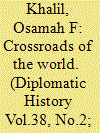|
|
|
Sort Order |
|
|
|
Items / Page
|
|
|
|
|
|
|
| Srl | Item |
| 1 |
ID:
132020


|
|
|
|
|
| Publication |
2014.
|
| Summary/Abstract |
In this paper, I argue that the "Middle East" is an ideational construct maintained by geographical, intellectual, and ideological representations. I assert that the geographical boundaries of the area called the Middle East have shifted over the past century to reflect the strategic interests of the major hegemonic power in the region, initially Britain and later the United States. Drawing on published and archival sources, I trace the etymology of the "Middle East" and its accompanying geographical representations and their relationship to key American and British foreign policy decisions and declarations. I also discuss how the Arabic translation of the "Middle East," or al-Sharq al-Awsa?, has been adopted and contested by scholars and journalists in the region.
|
|
|
|
|
|
|
|
|
|
|
|
|
|
|
|
| 2 |
ID:
113255


|
|
|
|
|
| Publication |
2010.
|
| Summary/Abstract |
The end of the Cold War coincided with a significant change in India's relationship with the rest of the world. The somnolent elephant awoke to energize itself by liberalizing its economy and quickly emerged as a potential major power in global politics. From the standpoint of its neighbours in South Asia, there might well be cause for anxiety. India has long been viewed as a hegemonic power in the region. Do the strengthening sinews of the regional 'hegemon' bode ill for them? The article argues that India was a limited hegemon in the past, but that, in the contemporary era, while its economic and military power are growing significantly, it is actually becoming less hegemonic in its orientation towards its neighbours. In contrast with its strategic behaviour in the 1980s, it has now adopted a less interventionist relationship with its neighbours and its strategic gaze is focused beyond South Asia to the global setting as it pursues the status of a world power.
|
|
|
|
|
|
|
|
|
|
|
|
|
|
|
|
| 3 |
ID:
188861


|
|
|
|
|
| Summary/Abstract |
This preliminary study focuses on the change in the regional security order caused
by the U.S.–China competition and its impact on South Korea–Japan relations. The
ongoing U.S.–China relations has expanded beyond the discussion of cooperation
and competition between existing and emerging powers, as well as the debate
over the influence and resilience of the U.S.-led liberal international order. The
significance of the U.S.–China competition in the security order in East Asia
depends on whether China will accept the existing U.S.-led bilateral alliance system
and take a status quo attitude. As a result, the U.S. allies, South Korea and Japan,
need to respond sensitively to the changing nature of the security order. In this vein,
this study explains the East Asian security order as elements of power structure,
institutions, and actors. In addition, it explains the emergence of China as a new
hegemonic power due to the U.S.–China competition, the hub-and-spokes system
changes according to the U.S. rebalancing policy, and the emergence of Trumpism.
Through this, the author argues two claims. First, the change in U.S.–China
relations has led to different expectations between Seoul and Tokyo for cooperation
with the U.S., which has hindered bilateral cooperation between them. Second,
divergent views on China also hinder South Korea–Japan cooperation. Through
the Senkaku dispute between Japan and China and the missile deployment dispute
between South Korea and China, the two countries later showed different directions
in their policy toward China. In the current competitive situation, restrictions on
South Korea–Japan relations are inevitable. However, if the opportunity to promote
security cooperation between South Korea and Japan is sought, it will be able to
show the cooperation of middle power countries that can develop the security order
to mitigate the intensity of U.S.–China competition.
|
|
|
|
|
|
|
|
|
|
|
|
|
|
|
|
|
|
|
|
|